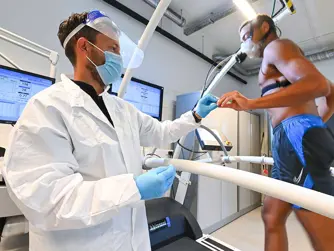News
New Drake Football Study findings unmask mental health symptoms in women's football

- Launched in 2019, Drake Football Study is a 10-year project tracking the physical and mental health of footballers
- Over 170 men’s and women’s players were included at baseline in the study, from their playing careers and transitioning through to retirement
- Latest findings reveal level of mental health symptoms among professional women’s players
New findings from the Drake Football Study reveal 20 percent of professional women’s footballers experienced disordered eating over a 12-month period.
Launched in 2019, the Drake Football Study is a 10-year project tracking the physical and mental health of around 170 men’s and women’s footballers – from their playing careers and transitioning through to retirement.
The latest sub-study paper, Unmasking Mental Health Symptoms in Female Professional Football Players, also reveals women’s players are nearly twice as likely to report sport-related psychological distress after each surgery.
Of the 74 players surveyed for this sub-study, 55 percent reported sport-psychological distress during the 12-month period (consistent with athletes across elite sports), while three percent reported substance misuse.
"We found that the level of psychological distress among these players was quite consistent over 12 months," said FIFPRO’s Chief Medical Officer Prof Dr Vincent Gouttebarge.
"Meanwhile, substance misuse was uncommon – substance misuse, of course, is not a synonym to performance in elite sport. We also saw confirmation of previous findings with regards to how severe injuries and related surgery are likely to induce mental health symptoms.
"These kinds of studies are significant because it enables us to raise awareness that elite athletes such as professional footballers are not superheroes – they are human-beings. That means they are likely to report some mental health problems sooner or later during their career or after retirement."

Over the last decade FIFPRO has been at the forefront when it comes to mental health challenges in football, starting in 2013 with a pilot project to help member unions develop and implement processes to safeguard players’ health. Many other support studies have since followed.
Raising awareness of the mental health struggles faced by footballers in today’s game is one of FIFPRO’s most pressing concerns.
"Players are screened pre-season for musculoskeletal injuries, for their level of endurance, strength and speed, for cardiovascular abnormalities, and the same should apply for mental health," said Prof Dr Gouttebarge.
"In Australia, for instance, thanks to the work done jointly by FIFPRO and Professional Footballers Australia, mental health screening in pre-season is now embedded in the minimum medical requirements. It’s a big step forward."

Disordered eating in football
One in five women’s footballers experienced disordered eating over a 12-month period, according to the Drake Football Study’s latest report.
The findings in women’s football are consistent with other sports but are lower when compared to aesthetic or weight-based combat sports such as gymnastics, judo, wrestling or boxing. Nonetheless, the findings raise player welfare concerns.
"For any mental health symptoms, including disordered eating, we need to focus on raising awareness and education for players to remain well-balanced in their life and keep a healthy eating regime, enabling them to perform and recover optimally and have a good quality of life," said Prof Dr Gouttebarge.
"There is a misconception that disordered eating might be something more for female athletes, rather than male athletes, but it's not automatically the case. Even with men’s football, we need to keep in mind the possibility of players having eating disorders."
More on the Drake Football Study

While the 10-year Drake Football Study is giving priority to joint pain in ankles, hips and knees of players, and how it can potentially impact the wellbeing of players in the long-term, it also aims to explore mental health symptoms such as anxiety and depression which are often reported by players. Further data from the study is set to be released in the coming months.
"A similar sub-study will be published soon, looking at mental health symptoms in the group of men’s footballers involved in the study," said Prof Dr Gouttebarge.
"We also have to digest data around cognitive functions in men’s football as well as clinical joint functions in women’s football. We are now also analysing data on female-specific health such as reproductive health and menstrual cycle."
The Drake Football Study is seed-funded by The Drake Foundation and supported by Amsterdam University Medical Centers, Mehiläinen (Finland) and Push Sports (The Netherlands).
Prof Dr Gouttebarge is the project lead together with Prof Dr Gino Kerkhoffs, chair of the Orthopedic Surgery and Sports Medicine department at the Amsterdam University Medical Centres.
